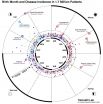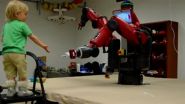Study examines association between cholesterol-lowering drugs, memory impairment
2015-06-08
(Press-News.org) Both statin and nonstatin cholesterol-lowering drugs were associated with memory loss in the first 30 days after patients started taking the medications when compared with nonusers, but researchers suggest the association may have resulted because patients using the medications may have more contact with their physicians and therefore be more likely to detect any memory loss, according to an article published online by JAMA Internal Medicine.
Acute memory loss associated with the use of statins has been described in case reports and case studies, as well as in some studies, but the findings have been inconsistent and studies of long-term use of statins have found either improved memory or no effect.
Brian L. Strom, M.D., M.P.H., of Rutgers University, Newark, N.J., and co-authors used The Health Improvement Network (THIN) database, which is composed of the primary medical records from general practitioners in the United Kingdom, to compare 482,543 statin users with two control groups: 482,543 nonusers of any lipid-lowering drugs (LLDs) and 26,484 users of nonstatin LLDs (for example, cholestyramine, colestipol hydrochloride, colesevelam, clofibrate, gemfibrozil, fenofibrate and niacin). The authors also conducted a secondary case-crossover study. Diagnostic codes were used to gather data on memory loss.
The authors found that when comparing statin users to nonusers of any LLDs there was an increased risk of memory loss during the 30 days following the start of the medication, as well as increased risk in the first 30 days when comparing users of nonstatin LLDs with nonusers. That association was not there when comparing statins vs. nonstatin LLDs.
'This finding suggests that either all LLDs cause acute memory loss, or perhaps more likely, that the association is the results of detection bias,' the study concludes. Detection bias is the higher likelihood that memory loss will be ascertained in patients receiving preventive therapies, such as cholesterol-lowering medications, because they have increased contact with their physicians.
INFORMATION:
(JAMA Intern Med. Published online June 8, 2015. doi:10.1001/jamainternmed.2015.2092. Available pre-embargo to the media at http://media.jamanetwork.com.)
Editor's Note: Authors made conflict of interest disclosures. This study was supported by a grant from the National Institutes of Health. Please see the article for additional information, including other authors, author contributions and affiliations, financial disclosures, funding and support, etc.
Contact:
Dory Devlin
ddevlin@ucm.rutgers.edu
908-872-6979 or email
ELSE PRESS RELEASES FROM THIS DATE:
2015-06-08
Researchers at University of Helsinki, Finland, and Karolinska Institutet, Sweden, discovered previously uncharacterized mutational patterns in the human regulatory genome, especially in gastrointestinal tract cancers. The study was published in Nature Genetics.
The research led by Academy Professor Lauri Aaltonen and Professor Jussi Taipale, was based on study of more than two hundred whole genomes of colorectal cancer samples. The scientists detected a distinct accumulation of mutations specifically at sites where the proteins CTCF and cohesin bind the DNA.
Both ...
2015-06-08
It's a notion that might be pulled from the pages of science-fiction novel - electronic devices that can be injected directly into the brain, or other body parts, and treat everything from neurodegenerative disorders to paralysis.
It sounds unlikely, until you visit Charles Lieber's lab.
A team of international researchers, led by Lieber, the Mark Hyman, Jr. Professor of Chemistry, an international team of researchers developed a method for fabricating nano-scale electronic scaffolds that can be injected via syringe. Once connected to electronic devices, the scaffolds ...
2015-06-08
Genes linked to creativity could increase the risk of developing schizophrenia and bipolar disorder, according to new research carried out by researchers at the Institute of Psychiatry, Psychology & Neuroscience (IoPPN) at King's College London.
Previous studies have identified a link between creativity and psychiatric disorders such as bipolar disorder, but it has remained unclear whether this association is due to common genes. Published today in Nature Neuroscience, this new study lends support to the direct influence on creativity of genes found in people with schizophrenia ...
2015-06-08
ITHACA, N.Y. - If you want people to choose healthier foods, emphasize the positive, says a new Cornell University study.
Published in the American Journal of Agricultural Economics, the Cornell Food and Brand Lab study showed that when it comes to nutrition education, dos work a lot better than don'ts. This is especially important when determining policies that encourage healthy eating.
Media note: A short video explaining the research, as well as an informational graphic and additional details about this research can be found at, http://foodpsychology.cornell.edu/OP/Hidden_Costs ...
2015-06-08
This news release is available in French. A new joint study by researchers at the Montreal Neurological Institute and the Centre for the Study of Democratic Citizenship, both at McGill University, has cast some light on the brain mechanisms that support people's voting decisions. Evidence in the study shows that a part of the brain called the lateral orbitofrontal cortex (LOFC) must function properly if voters are to make choices that combine different sources of information about the candidates. The study found that damage to the LOFC leads people to base their vote ...
2015-06-08
A new study gives insight into the mental health of children and teens with Down syndrome and the behavioral medications that medical caregivers sometimes prescribe for them.
The Cincinnati Children's Hospital Medical Center study shows that teens and young adults between the ages of 12 and 21 were significantly more likely to be on psychotropic medications than children 5 to 11 years old. Among children less than 12, the odds of being on a psychotropic medication increased with age for all classes of medications studied. For 12 to 18 year olds, the odds of being on ...
2015-06-08
NEW YORK, NY (June 8, 2015) - Columbia University scientists have developed a computational method to investigate the relationship between birth month and disease risk. The researchers used this algorithm to examine New York City medical databases and found 55 diseases that correlated with the season of birth. Overall, the study indicated people born in May had the lowest disease risk, and those born in October the highest. The study was published in the Journal of American Medical Informatics Association.
"This data could help scientists uncover new disease risk factors," ...
2015-06-08
PROVIDENCE, R.I. [Brown University] -- Researchers from Brown University are developing a new algorithm to help robots better plan their actions in complex environments. It's designed to help robots be more useful in the real world, but it's being developed with the help of a virtual world -- that of the video game Minecraft.
Basic action planning, while easy for humans, is a frontier of robotics. Part of the problem is that robots don't intuitively ignore objects and actions that are irrelevant to the task at hand. For example, if someone asked you to empty the trashcan ...
2015-06-08
Researchers at the University of Illinois at Urbana-Champaign have uncovered physical mechanisms allowing the manipulation of magnetic information with heat. These new phenomena rely on the transport of thermal energy, in contrast to the conventional application of magnetic fields, providing a new, and highly desirable way to manipulate magnetization at the nanoscale.
"In our study, we make use of the fact that a heat current passing through a magnetic material creates a separation of electron spins. This process creates a current of magnetic dipoles that we use to manipulate ...
2015-06-08
DARIEN, IL - A new study suggests that increased restless legs syndrome (RLS) severity is associated with subsequent increased risk of stroke.
Results show that increased RLS severity is associated with subsequent increased risk of stroke, after considering other known risk factors such as age, smoking, hypertension, and unhealthy diet. There were 161 incident stroke cases during the six-year follow-up.
"We were surprised at the importance of taking into account RLS severity -- it was only severe RLS, not milder RLS, that was associated with increased risk of stroke," ...
LAST 30 PRESS RELEASES:
[Press-News.org] Study examines association between cholesterol-lowering drugs, memory impairment



